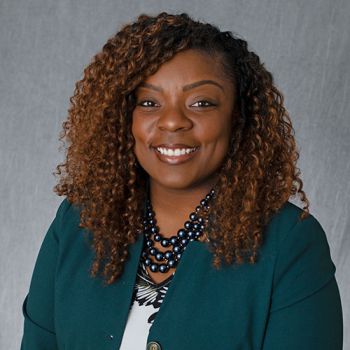
This year’s Black History Month highlights Black health and wellness, and the George Washington University (GW) School of Medicine and Health Sciences (SMHS), with the Office of Diversity and Inclusion, spoke with members of the SMHS community about the meaning and spirit behind this theme. Here, Janeale Gottlieb-George discusses the importance of self-care, what changes she would like to see for Black medical and health sciences students, and what Black History Month means to her.
What is your role at SMHS?
Gottlieb-George: I am the director of Upward Bound at GW, a college-prep program funded to serve a population of predominantly low-income and first-generation college students in Washington, D.C. We provide academic and socio-emotional support to each participant. Our services include weekly tutoring, SAT-prep workshops, and a six-week summer enrichment program.
What word or phrase would you use to describe the spirit of Black History Month for you?
Gottlieb-George: Unapologetically celebrating our past, present, and future
Why is it important for GW to recognize Black History Month?
Gottlieb-George: Celebrating Black History Month at GW creates space for, and gives permission to, Black and brown students to be inspired by their own innate abilities and characteristics. It shows that they are supported, welcomed, and encouraged to explore more of themselves.
This year’s national Black History Month theme is Black health and wellness; why do you think this topic is important? How do you take care of your own health and wellness?
Gottlieb-George: Black health and wellness is an important topic to highlight because too often we are burdened by our strength and ability to be the best we can for others. We have to do better at taking care of ourselves first. Therapy has been a game-changer for me as it has allowed me to prioritize self-care, discover and understand my mental wellness needs, and [develop] the grace to not let some of life’s pressures weigh me down.
Why is it important to use Black History Month as a time to reflect, think, and celebrate Black history and culture?
Gottlieb-George: We should be celebrating Black history and culture year-round, not just in February. Black history is a part of the very fabric of this country and the history of many other parts of the world. It’s important to teach that and bring those messages into GW’s classrooms by default and not as a month-long lesson plan or theme.
What would you like to see happen for prospective Black medical and health sciences students in the future?
Gottlieb-George: I would love to have more mentorship opportunities between my high school students and incoming Black students at SMHS. Due to their busy schedules, I am flexible on the frequency and structure of what these “mentorship moments” could look like.
What barriers currently exist for Black students, and how can they be overcome?
Gottlieb-George: In my observation as an SMHS staff member, I see that a barrier for Black students might be that there are not enough Black professors or Black professionals in support offices.


